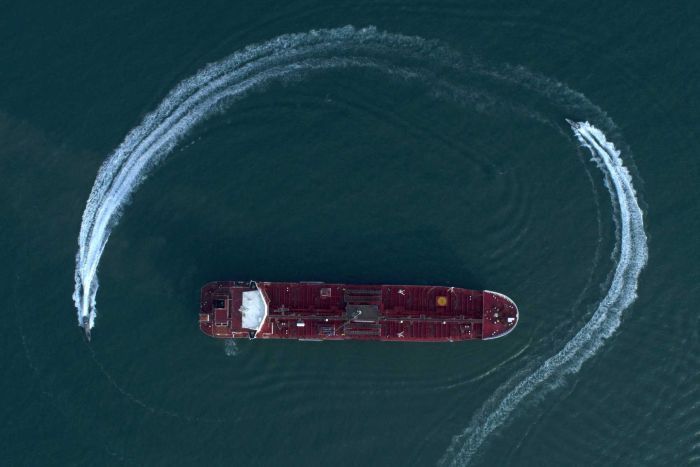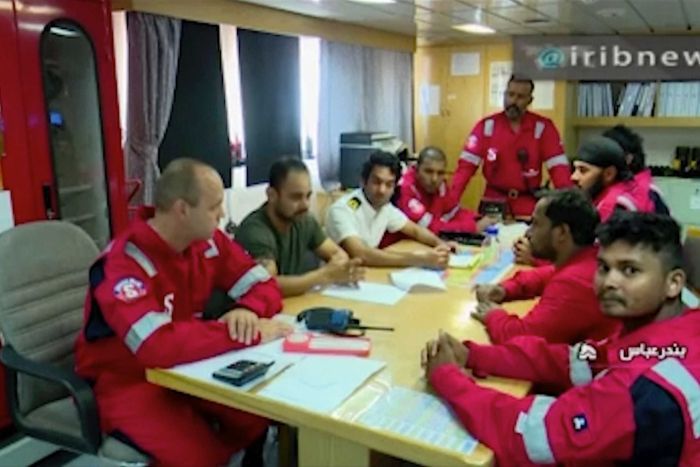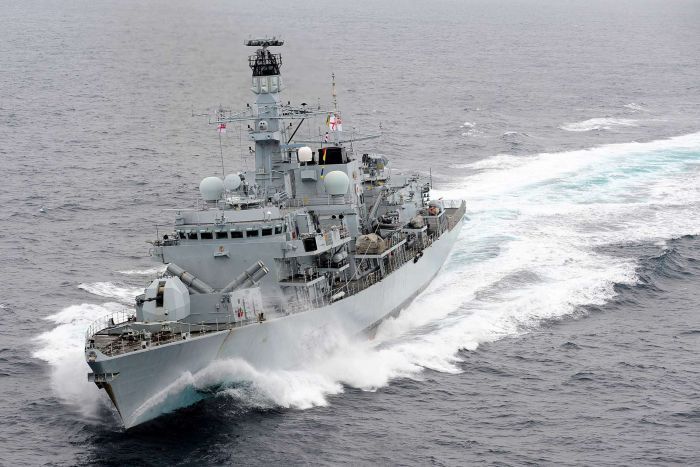
'Not on the table': Britain tells Iran there will be no tanker swap
Updated

Photo:
British-flagged oil tanker Stena Impero was seized in the Strait of Hormuz last month. (AP: Morteza Akhoondi/Tasnim News Agency)
Britain has ruled out exchanging an Iranian tanker detained by Gibraltar for a British-flagged tanker seized by Iran, saying a barter “is not on the table”.
Key points:
- Twenty-three crew members of the British-flagged tanker have been detained on the vessel
- Royal Dutch Shell said it would not take any British tankers through the Strait of Hormuz
- The US has been trying to forge a military coalition to secure Gulf waters
Tensions have spiked between Iran and Britain since Iranian commandos seized a British-flagged tanker in the Strait of Hormuz last month.
That came after British forces captured an Iranian oil tanker near Gibraltar, accused of violating European sanctions by taking oil to Syria.
“If people or nations have detained [a] UK-flagged [tanker] illegally then the rule of law and rule of international law must be upheld,” British Foreign Secretary Dominic Raab said while on a trip to Bangkok.
“We are not going to barter a ship that was detained legally with a ship that was detained illegally: that’s not the way that Iran will come in from the cold,” he said.
“So I am afraid some kind of barter or haggle or linkage is not on the table.”
The seizure of the British tanker followed weeks of threats from Tehran to retaliate for Britain’s seizure of the Iranian tanker Grace 1, but Iran’s foreign secretary Mohammad Javad Zarif said the Stena Impero was “violating international maritime rules”.
Crew members still detained
The 23 crew members of the British-flagged tanker — who are Indian, Russian, Latvian and Filipino — have been detained on the vessel, which is moored off the Iranian port of Bandar Abbas.
Since the ship’s seizure on July 19, Stena Bulk and Northern Marine Management have urged both governments to “find a swift resolution so our 23 valued seafarers can return to their families and move on from this ordeal”.
The security of shipping in the Gulf, through which about a fifth of the world’s oil passes, has shot up the international agenda since May when Washington accused Iran of being behind explosions that holed six tankers over several weeks.

Photo:
The 23 crew members of the British-flagged tanker are Indian, Russian, Latvian and Filipino. (AP: IRIB News Agency)
Britain’s former foreign secretary Jeremy Hunt last week said the UK would create a European-led maritime protection mission to ensure safe shipping through the Strait of Hormuz.
“We will now seek to put together a European-led maritime protection mission to support safe passage of both crew and cargo in this vital region,” Mr Hunt said at the time.
US President Donald Trump has been trying to forge a military coalition to secure Gulf waters, though European allies have been loath to join for fear of provoking open conflict.
Speaking prior to Boris Johnson becoming the UK’s new prime minister, Mr Hunt said he would discuss how the maritime mission would complement US proposals in the area, but that Britain would not join the US plan as it wanted to preserve a nuclear deal reached with Iran.
Russia, another party to the 2015 deal, said on Thursday the US naval mission looked like a crude attempt to pressure Iran.
“Events there are really moving to a dangerous point and there are risks of a large-scale military clash,” RIA cited Foreign Ministry spokeswoman Maria Zakharova as saying.
“In principle we have the sense that Washington is simply looking for a pretext to whip up the situation, continue its aggressive rhetoric towards Iran, and to shift to a hotter, more active phase of the conflict.”

Photo:
The UK said they would create a European-led maritime protection mission to ensure safe shipping through the Strait of Hormuz. (Crown Copyright: Joel Rouse)
ABC/wires
Topics:
navy,
First posted
